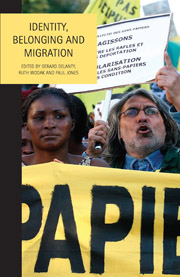Book contents
- Frontmatter
- Contents
- Acknowledgements
- List of Figures
- Notes on Contributors
- Introduction: Migration, Discrimination and Belonging in Europe
- I Theoretical Perspectives on Belonging
- II Institutional Forms of Discrimination
- 5 Racism, Anti-Racism and the Western State
- 6 What Space for Migrant Voices in European Anti-Racism?
- 7 Multiculturalization of Societies: The State and Human Rights Issues
- 8 Towards a Theory of Structural Discrimination: Cultural, Institutional and Interactional Mechanisms of the ‘European Dilemma’
- 9 On Institutional and Agentic Discrimination: Migrants and National Labour Markets
- 10 Non-Place Identity: Britain's Response to Migration in the Age of Supermodernity
- III Cases of Belonging and Exclusion
- Conclusion: Discrimination as a Modern European Legacy
- Index
10 - Non-Place Identity: Britain's Response to Migration in the Age of Supermodernity
from II - Institutional Forms of Discrimination
- Frontmatter
- Contents
- Acknowledgements
- List of Figures
- Notes on Contributors
- Introduction: Migration, Discrimination and Belonging in Europe
- I Theoretical Perspectives on Belonging
- II Institutional Forms of Discrimination
- 5 Racism, Anti-Racism and the Western State
- 6 What Space for Migrant Voices in European Anti-Racism?
- 7 Multiculturalization of Societies: The State and Human Rights Issues
- 8 Towards a Theory of Structural Discrimination: Cultural, Institutional and Interactional Mechanisms of the ‘European Dilemma’
- 9 On Institutional and Agentic Discrimination: Migrants and National Labour Markets
- 10 Non-Place Identity: Britain's Response to Migration in the Age of Supermodernity
- III Cases of Belonging and Exclusion
- Conclusion: Discrimination as a Modern European Legacy
- Index
Summary
Becoming a British citizen is a significant life event. The Government intends to make gaining British citizenship meaningful and celebratory rather than simply a bureaucratic process. New citizenship ceremonies will help people to mark this important event. We want British citizenship to embrace positively the diversity of background, culture, and faiths that living in modern Britain involves. The Government is also concerned that those who become British citizens should play an active role, both economic and political in our society, and have a sense of belonging to a wider community.
The Home Secretary the Rt Hon. David Blunkett, MP, 9 September 2002 (Home Office 2004: 3)The acquisition of citizenship, the bureaucratic process of changing the legal status of residency in an institutionally defined territory termed a nation, is usually perceived in legal, societal and personal terms as a major repositioning of the individual. Research in response to the changing realities and experiences of migration in the age of globalization has focused on the definition of transnational citizenship and posits as a basic premise that all citizenship questions rest on the interaction between legal rights and personal membership (Fox 2005; Stokes 2004). In the above quotation, from the then British Home Secretary David Blunkett, the repositioning of the self in relation to the nation is presented as a ‘significant life event’ which should be ‘meaningful and celebratory’ and should lead to a ‘a sense of belonging to a wider community’.
- Type
- Chapter
- Information
- Identity, Belonging and Migration , pp. 198 - 217Publisher: Liverpool University PressPrint publication year: 2011
- 1
- Cited by



